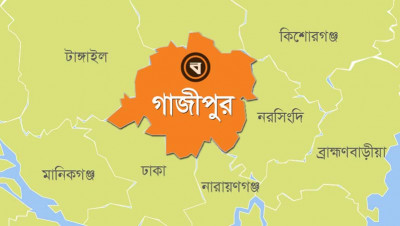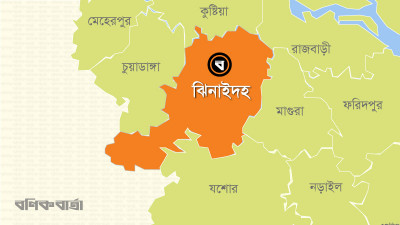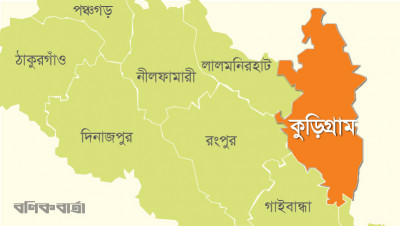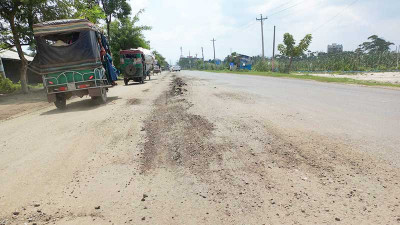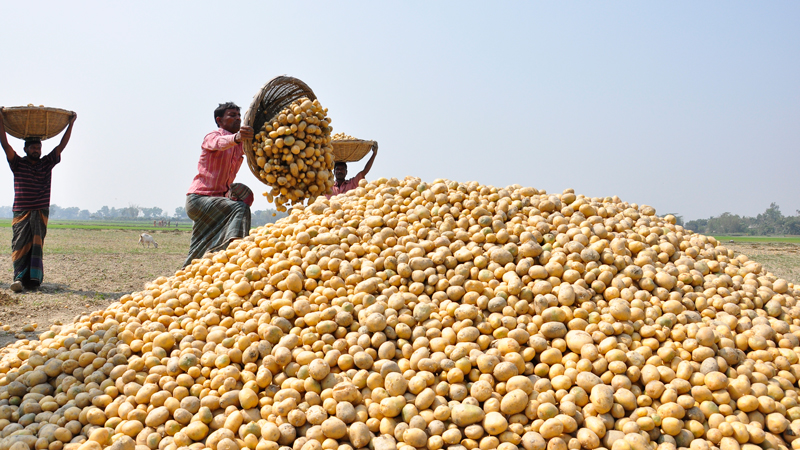 Photo : Bonik Barta
Photo : Bonik Barta The annual demand of
potatoes in the country is 8 million tons. Bangladesh witnessed a potato
surplus in the last fiscal year (2023-24). The country had a satisfactory
potato production of 10 million tons. The Department of Agricultural Extension
statistics show that in the last fiscal year, the potato production in
Bangladesh was at least 3 million tons more than the demand. According to the
Department of Agriculture Marketing, it only costs BDT 10.51 per kg in potato
production. Yet these potatoes are now sold at BDT 60 per kg in the capital's
retail market.
Potato is one of the
commodities experiencing significant price volatility in the country today.
Fluctuations and instability in potato prices were evident throughout the last
fiscal year (ending June 2024) as well. Govt allowed potato imports and this
policy is still in effect. Yet the government is struggling to bring the market
under control despite various measures. In addition, the retail price of
potatoes is now about 20-25 taka more than in the same period last year.
Market analysts say
fluctuations in potato prices tend to be unbelievably high. According to them,
if information from the Ministry of Agriculture is correct, there should be a
surplus of potatoes in the country even after accounting for 10-15 percent of
waste after production. There are also no restrictions in place for imports,
which should result in lower prices. However, the market situation paints a
different scenario. In Karwan Bazar, the wholesale price of potatoes was BDT 54
per kg, while the retail price was BDT 60.
Data from the Department
of Agriculture Marketing shows the production cost of potatoes in the FY
2022-23 was BDT 10.51 per kg. While information on the previous year's cost is
unavailable, experts believe it hasn't changed significantly. The average cost
to produce potatoes per acre is slightly over BDT 114,000. This expenditure
includes land prep, fertilizer, seeds, labor, irrigation, pesticides, land
leasing, and loan interest. With an average yield of 10,892 kg per acre, the
production cost per kg comes to BDT 10.27.
Food and agricultural
market observers point to middlemen profiting the most, as much of the surplus
value from potato production ends up in their pockets. Some analysts suspect a
syndicate of cold storage owners and traders may be the major culprit behind
the price hike. Others express their doubts about the production data provided
by officials. This lack of accurate information significantly hinders overall
market management, further exacerbating the unexpected surge in potato prices.
Former food secretary
Abdul Latif Mondal told Bonik Barta, "There might be a syndicate between
cold storage owners and traders. If production exceeds demand, where does the
surplus potato go? This rather points to a failure in market management. We
often see the same problem with eggs and onions as well. The government lacks
control over market management. Otherwise, let the government officially answer
why prices are increasing."
In terms of local
production in the country, potato is second only to rice. Potato is seen as a
major source of protein for the low-income group. Currently, Bangladesh ranks
seventh in global potato production.
When asked about the
reason behind the rise of potato prices despite the production exceeding the
demand, Bangladesh Cold Storage Association President Mostafa Azad Chowdhury
Babu told Bonik Barta, “Farmers have made a profit of more than BDT 20 per kg.
About 70 percent of potatoes kept in our cold storage belong to farmers and
traders. Farmers sold the potatoes for BDT 30 per kg. We charge BDT 10 per kg
for storage. With a minimum profit of BDT 5, the potatoes have to be sold at
BDT 45.”
This business leader
won't agree with the information provided by officials about potato production.
“This year the production could not have exceeded 8 million tons. The
information provided by the government is incorrect. Many cold storages are
lying empty due to low production.”
According to Department
of Agriculture Extension (DAE) data, Bangladesh has an annual demand of 7.5
million to 8 million tons of potato. Against this demand, potato production in
the FY 2022-23 was over 10 million tons. In this situation, even government
officials don't find any logic in the soaring price of potatoes.
Badal Chandra Biswas,
Director General of the Department of Agriculture Extension (DAE), told Bonik
Barta, “There is no congruity between the cost of production and the retail
price of any produce in this country. Compared to last year, more potatoes are
stocked in cold storage. There has been an increase in the use of potatoes in
new restaurants. But raising prices too much is illogical. It is an issue of
market management.”
Experts warn that the gap
between production information and the actual supply picture is driving up
potato prices in the market. They also point to irresponsible hoarding as a
major factor behind the prevailing supply shortage.
Agricultural economist
Dr. Jahangir Alam Khan told Bonik Barta, “Farmers do not get more than BDT
15-20 per kg. In this case, the retail price of potato should have been around
BDT 25-30 per kg. However, if it exceeds BDT 35 then there has to be some
manipulation taking place. Production is not sufficient either. Production data
misleadingly affects the market. Traders and cold storage owners are running a
syndicate. Hoarding is creating a supply shortage. As a result, the retail
price is increased.”
Bangladesh has been a
small-scale exporter of potatoes in recent years, with production exceeding
local demand. However, exports faced a setback in FY 2015-16 due to a temporary
Russian ban imposed in May 2015 to prevent the import of potatoes with harmful
diseases. This caused a significant drop, from 91,000 tons exported to only
40,000 tons. Although Russia lifted the ban in March 2022 following
Bangladesh's efforts to ensure potato safety, the situation has shifted, and
the government is currently authorizing potato imports to meet domestic needs.
Former Minister of
Planning and Agricultural Economist Dr. Shamsul Alam believes that syndicates
or hoarding are not to blame for the current potato market situation. He told
Bonik Barta, "It is not possible to control the potato market through
syndicates. There are more than 450 cold storages in the country, and not everyone
sells at once. Therefore, there is no other reason behind the price hike other
than production shortfall. We used to export potatoes, but now many farmers are
turning to maize cultivation as it is much more profitable. Farmers are
naturally influenced by the price of their produce. It is illogical to blame
everything on the practice of hoarding, which is an important strategy for
marketing and selling goods."

